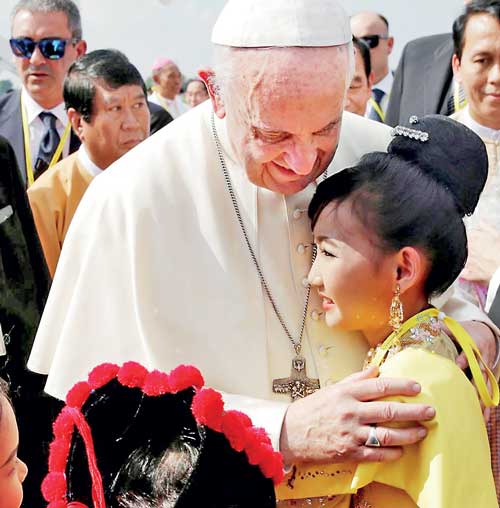Saturday Feb 21, 2026
Saturday Feb 21, 2026
Tuesday, 28 November 2017 00:00 - - {{hitsCtrl.values.hits}}
Yangon (Reuters): Pope Francis landed in Yangon on Monday, the start of a delicate visit for the leader of the Roman Catholic church to majority-Buddhist Myanmar, which the United States has accused of conducting “ethnic cleansing” against its Muslim Rohingya people.
The pope will also visit Bangladesh, where more than 620,000 Rohingya have fled to escape what Amnesty International has dubbed “crimes against humanity”.
The Myanmar army has denied the accusations of murder, rape, torture and forcible displacement.
After leaving Rome, the pope told reporters on his plane: “They say it’s too hot (in Myanmar). I‘m sorry, but let’s hope it will at least be fruitful.”
Ethnic minorities in traditional dress welcomed Francis at Yangon airport, and children presented him with flowers as he stepped off his plane.
He waved through an open window at dozens of children waving Vatican and Myanmar flags and T-shirts with the motto of the trip – ‘love and peace’ - as he set off in a light blue Toyota car for St. Mary’s Cathedral in the heart of the city.
Only about 700,000 of Myanmar’s 51 million people are Roman Catholic. Thousands of them travelled by train and bus to Yangon, and they joined crowds at several roadside points along the way from the airport to catch a glimpse of the pope.
“We come here to see the Holy Father. It happens once in hundreds of years,” said Win Min Set, a community leader who brought a group of 1,800 Catholics from southern and western states of the country.
“He is very knowledgeable when it comes to political affairs. He will handle the issue smartly,” he said, referring to the sensitivity of the pope’s discussions about the Rohingya. Large numbers of riot police were mobilised in the country’s main city but there were no signs of any protests.
The trip is so delicate that some papal advisers have warned him against even saying the word ‘Rohingya’, lest he set off a diplomatic incident that could turn the Buddhist-majority country’s military and government against minority Christians. The Rohingya exodus from Rakhine state to Bangladesh’s southern tip began at the end of August, when Rohingya militants attacked security posts and the Myanmar army launched a counter-offensive.
US Secretary of State Rex Tillerson last week called the military operation “ethnic cleansing” and threatened targeted sanctions for “horrendous atrocities”.
AFP: Rohingya are still fleeing into Bangladesh even after an agreement was signed with Myanmar to repatriate hundreds of thousands of the Muslim minority displaced along the border, officials said Monday.
The arrangement struck by the neighbours on Thursday raised the prospect of at least 700,000 Rohingya Muslims living in overcrowded camps in southeastern Bangladesh being returned to Myanmar.
But at least 3,000 refugees have crossed since then, the United Nations said in its latest report on the crisis, with guards at check-posts along the frontier also reporting a largely uninterrupted flow of newcomers.
“The number of arrivals has declined, but it has not stopped,” Bangladesh border guard commander Lieutenant Colonel S.M. Ariful Islam told AFP.
Islam said at least 400 refugees had passed by guards under his command along the border with Myanmar since the agreement was signed.
An estimated 624,000 Rohingya have fled a military crackdown in Myanmar since August described by UN and US authorities as ethnic cleansing.
The repatriation agreement applies to Rohingya refugees living in Bangladesh who fled Myanmar in two major outbreaks of violence since October 2016.
It does not extend to an estimated 200,000 Rohingya refugees who were living in Bangladesh prior to that date.
The UN refugee agency UNHCR has raised concerns over the terms of the arrangement, saying conditions for the safe return of the Rohingya were not yet in place.
Bangladesh said at the weekend those returned would initially live in temporary shelters or camps.
Rohingya leaders have said they will not return to Myanmar unless they are recognised as citizens with full rights and ensured protection from violence.
Myanmar does no recognise the Rohingya, denying them citizenship and restricting their movement.
The UNHCR says any repatriation deal must include “the informed consent of refugees”.